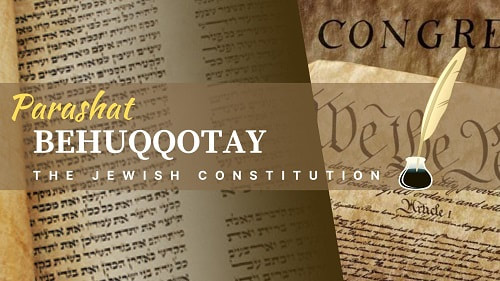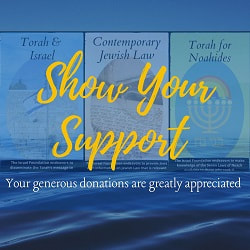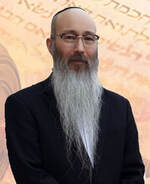|
By: HaRav Menashe Sasson Reporting from Jerusalem, Israel Published in the U.S.A. The root of the Hebrew word “Behuqqotay” [בחקתי] or [בחוקותי] is “hok” [חק] or [חוק], which means “law” or “statute.” “Behuqqotay” means “in My statutes.” A related word “hoka” [חוקה] means “constitution.” Thus, we see that the Torah – HaShem’s statutes – is the “The Jewish Constitution.” Likewise, the Shema, “Hear Yisra’el, the L-rd is our G-d, the L-rd is One [שמע ישראל, יי אלהיני יי אחד],” is the Jewish Pledge of Allegiance. Parashat Behuqqotay begins with HaShem saying, “If you walk in My statutes and keep My commandments, and do them, then I will give you rain in due season and the land shall yield its increase, and the trees of the field shall yield their fruit. . . .” Vayyiqra 26:3-4. In other words, HaShem is telling the Jewish people that if they live according to the Torah, that is, according to The Jewish Constitution, then HaShem will bless them; He will give the Jewish people rain when rain is needed and make “the land” productive. The land to which HaShem is referring is not, of course, Boston, Brussels, Berlin, Barcelona, Beijing, or Bombay; “the Land” is Eretz Yisra’el. How do we know that HaShem is referring to Eretz Yisra’el? We know this because HaShem just told us in Parashat BeHar Sinay that HaShem brought the Jewish people “out of the land of Misrayim to give [them] the land of Kena’an,” that is, to give the Jewish people Eretz Yisra’el, “and to be [their] G-d.” Vayyiqra 25:38. Returning to Parashat Behuqqotay, we find that HaShem, after telling the Jewish people that He will bless them if they live according to the Torah, then proceeds to give the Jewish people an admonition [תוכחה], telling them that He will punish them if they fail to comply with the commands of the Torah. “But if you will not harken to Me and will not do all of these commands, and if you shall despise My statutes, or if your soul abhor My judgments so that you will not do all of My commandments. . . .” Vayyiqra 26:14. The admonition [תוכחה] then continues, setting forth five increasingly severe levels of punishment for continued disobedience. Vayyiqra 26:14 – 26:43. The defining characteristic of the Jew, and of the Jewish people as a whole, is – and must be – the Torah. It is the Torah that makes the Jew a Jew, and it is the Torah that makes the Jewish people a nation. Without the Torah, there would be no Jew, no Jewish people or nation, and, by logical extension, without the Torah, there could be no Jewish state. In its May 14,1948, Declaration of Independence, the State of Israel committed to implementing a written constitution no later than October 1, 1948. Although the State of Israel has yet to draft, let alone ratify or implement, a written constitution, it has adopted provisions of law known as “Basic Laws.” Israel’s Basic Laws do not meet the definition of a constitution, but nevertheless are regarded as quasi-constitutional in nature. Included in those Basic Laws is a provision which declares the State of Israel to be a “Jewish State.” The State of Israel, however, having failed to adopt the Torah as its constitution, is not a “Jewish State,” but rather, as currently constituted, is little more than a “state for Jews, Arabs, and others.” If the State of Israel to be a Jewish State, it must adopt the Torah as its constitution and then pass and enforce laws that are not inconsistent with the Torah. The mere suggestion that the State of Israel should govern itself in accordance with the Torah would, however, be met with considerable opposition, both from within and without Israel and from within and without the Jewish people. But before dismissing the idea out-of-hand, let us consider how well (or not) the supposedly Jewish state, which has been in existence since May 14, 1948, has performed the fundamental task of protecting Jewish-Israelis from Arab-Israeli terrorism. Under the current system, terrorism against Jews by Israeli-Arabs has persisted, and even flourished. This is true notwithstanding – and in all likelihood because of – the fact that the State of Israel has extended full rights of citizenship to Israeli-Arabs, including voting rights; government employment and welfare benefits; national health care; and education, from grade school through university. The Jewish Constitution (aka: the Torah) commands that the Jewish people conquer the Land and expel the conquered inhabitants, and enjoins the Jewish government from entering into an agreement with conquered inhabitants that would allow them to remain in the Land.
Shemot 34:11-17. The Halakha relating to non-Jews living in Eretz Yisra’el recognizes two classes of people: those who claim an ownership or similar interest in Eretz Yisra’el and those who do not claim any such interest. Regarding those who claim an ownership interest in the Land, the Torah is not merely referring to ancient civilizations who just happened to be occupying Eretz Yisra’el prior to the arrival of the Jewish people; rather, the Torah is referring to any people – for all time – who claim a legal right to Eretz Yisra’el. According to the Or HaChaim:
Abarbanel, Commentary on Shemot 34:11-12. The State of Israel has failed to heed both the Jewish Constitution (aka: the Torah), as well as the Rabbis’ interpretation and explanation thereof. True to the words of Parashat Behuqqotay, “But if you will not harken to Me and will not do all of these commands, and if you shall despise My statutes, or if your soul abhor My judgments so that you will not do all of My commandments. . . ,” Vayyiqra 26:14-43, HaShem brings punishment, in the form of Arab-Israeli terrorism, upon the Jewish people. The State of Israel is a country where any Jew, from anywhere in the world, is welcome to immigrate. The Israeli “law of return,” which is a statutory right for Jews to immigrate to Israel, is a central feature of Israeli immigration and citizenship law. Many Jews who would immigrate to Israel might do so to escape antisemitism in their country of origin. However, when it is more dangerous for a Jew to live in Israel than it is for him to remain in exile [גלות], the reason for him to make Aliyah [עליה] (immigrate to Israel) is negated. Likewise, when it is more dangerous for a Jewish immigrant to remain in Israel than it is for him to return to a foreign country where he has a legal right to reside, the incentive for a Jew who has made Aliyah [עליה] to remain in Israel is placed at-risk. Furthermore, Arab-Israelis who would commit terrorist acts against Jewish-Israelis have made no secret of the fact that they would like to permanently alter the Jewish character of the State of Israel:
Na’ama Saud, a teacher from the Israeli-Arab village of Araba; May 28, 1976. Under the current system, which extends voting rights to all Israeli citizens, Jewish and Arab alike, there is no legal impediment to Arab-Israelis expanding their electoral influence and then voting to change the name of the “State of Israel” to, G-d forbid, the “State of Palestine.” If that were ever to occur, it would then be but a small step to repeal the Israeli Law of Return; deny Jews the rights of citizenship; and even expel Jews from Eretz Yisra’el, just as Arabs have expelled Jews from Arab lands. These undesirable events, all of which the Torah and Rabbis have provided ample warning, can be avoided only if the Jewish people of Eretz Yisra’el make the Torah their constitution and use it to govern themselves. Doing so will not be easy, however, HaShem has promised that He will bestow abundant blessings upon us if we, the Jewish people, follow His Torah. שבת שלום Shabbat Shalom! Copyright © The Israel Foundation. All Rights Reserved.
0 Comments
Your comment will be posted after it is approved.
Leave a Reply. |
THE ISRAEL FOUNDATION





